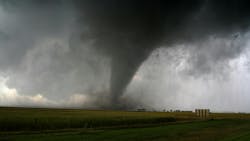Research Project Uses 2020 Nashville Tornado Simulation to Study Microgrid Support for Essential Services
Tennessee State University (TSU), in collaboration with local and federal partners, is participating in a research project that uses a virtual simulation of the March 2020 Nashville tornado. The goal is to examine how microgrid systems — localized, self-contained electrical grids — can help maintain essential services during major weather events.
The project involves TSU, the Electric Power Research Institute (EPRI), L&T, the Tennessee Valley Authority (TVA), Nashville Electric Service (NES), and the Metropolitan Government of Nashville and Davidson County. This initiative is part of the ARCHER (Accelerating Resilience of the Community through Holistic Engagement and use of Renewables) project led by EPRI. The simulation will take place on TSU’s campus.
According to Dr. Saleh Zein-Sabatto, professor and chair of the Department of Electrical Engineering at TSU, the project seeks to align technological research with community preparedness efforts. As part of ARCHER, TSU established a Community Resilience Advisory Board (CRAB) to include local perspectives in identifying priority areas for power restoration and infrastructure resilience.
“NES realizes integrating distributed energy resources like microgrids, including solar PV, is crucial for enhancing the reliability and resilience of our grid,” says Tony Richman, Engineering Manager-Grid Transformation, with NES. “Initiatives like ARCHER that involve our customers firsthand, help NES prepare for unforeseen disruptions and strengthen relationships in the communities we serve.”
The project includes the development of interactive dashboards by L&T, designed to integrate utility and community data to support real-time decision-making. According to L&T Vice President Arindam Maitra, these tools may enhance situational awareness and planning capabilities for utility operators.
The simulation draws on community input and advanced modeling to examine the potential of microgrids to mitigate the impacts of extreme weather events. The results are intended to inform future strategies for improving energy resilience in Nashville and other regions.
“The research conducted at TSU has the potential for impactful change in Nashville and beyond, as we adapt our plans to mitigate the disruptions caused by climate-related events,” says Kendra Abkowitz, Senior Director of Sustainability and Resilience from the Mayor’s Office. “This collaborative approach ensures that our community will emerge stronger and more resilient in the face of future challenges.”
By leveraging data from the simulation and the ARCHER framework, Nashville and similar cities may gain insights to inform future energy security and disaster preparedness efforts.
